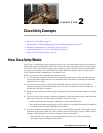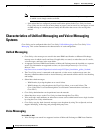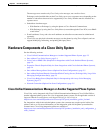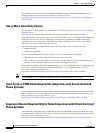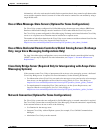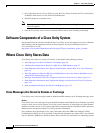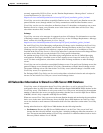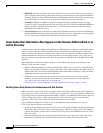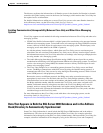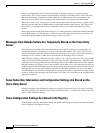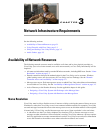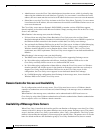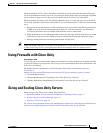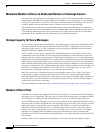
2-7
Design Guide for Cisco Unity Release 5.x
OL-14619-01
Chapter 2 Cisco Unity Concepts
Where Cisco Unity Stores Data
currently supported by DUC for Cisco, see the “Domino Requirements—Message Store” section of
System Requirements for Cisco
Unity at
http://www.cisco.com/en/US/products/sw/voicesw/ps2237/prod_installation_guides_list.html.
Cisco Unity can service subscribers on multiple Domino servers. You specify one Domino server (the
partner Domino server) through which Cisco
Unity communicates with the other Domino servers.
Cisco Unity can also service subscribers on Domino clusters. If subscribers are homed on one or more
Domino servers in a cluster, every Domino server in the cluster on which there will be Cisco
Unity
subscribers must have DUC installed.
Exchange
Cisco Unity can store voice messages in supported versions of Exchange. For information on versions
of Exchange currently supported for use with Cisco
Unity, see the “Exchange Requirements—Message
Store” section of System Requirements for Cisco
Unity at
http://www.cisco.com/en/US/products/sw/voicesw/ps2237/prod_installation_guides_list.html.
For small Cisco Unity Voice Messaging configurations, Exchange can be installed on the Cisco Unity
server, and all Cisco
Unity subscribers can have their Exchange mailboxes on the Cisco Unity server.
(Exchange can also optionally be installed on a separate server instead of, or in addition to, being
installed on the Cisco
Unity server.) A Cisco Unity subscriber is someone who has an Exchange mailbox
and whose Active Directory account includes Cisco
Unity-specific information.
For medium and large Cisco Unity Voice Messaging configurations and for all Unified Messaging
configurations, Exchange is installed on one or more separate servers instead of on the Cisco
Unity
server. For these configurations, subscribers can have their Exchange mailboxes on other Exchange
servers.
Cisco Unity can service subscribers on multiple Exchange servers. You specify one Exchange server (the
partner Exchange server) through which Cisco
Unity communicates with the other Exchange servers.
The partner Exchange server can either be the Cisco
Unity server (when Exchange is installed on the
Cisco
Unity server) or a separate server.
For Exchange 2003, Cisco Unity can also service subscribers on both active/active and active/passive
clusters. Do not install Cisco
Unity on a server in an Exchange cluster.
All Subscriber Information Is Stored in a SQL Server 2000 Database
Cisco Unity stores all information about Cisco Unity subscribers, as well as selected Cisco Unity
configuration data, in a SQL Server 2000 or Microsoft Data Engine 2000 (MSDE 2000) database on the
Cisco
Unity server. (The number of voice ports on the Cisco Unity server and, therefore, the maximum
number of subscribers the server can support, determines whether data is stored in SQL Server 2000 or
in MSDE, which is fully compatible with SQL Server 2000.)
When two or more Cisco Unity servers are in the same Domino domain and monitoring the same address
book, or are in the same Active Directory forest, the SQL Server 2000 database on each Cisco
Unity
server also includes a small amount of information about all of the subscribers on the other Cisco
Unity
servers.
Storing subscriber data in a SQL Server 2000 database has the following benefits:
• Performance: Because the SQL Server 2000 database is on the Cisco Unity server itself and
because the data is heavily indexed, accessing data—including looking up subscriber extensions—is
fast. The current maximum number of Cisco
Unity subscribers in a Domino address book or Active
Directory Global Address List is 250,000.





